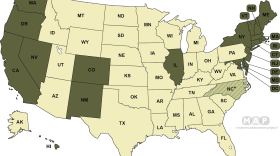It’s a Monday night in Salt Lake City and thousands of people are gathering to hear Democratic presidential nominee Pete Buttigieg, former mayor of South Bend, Indiana, speak at a convention hall downtown. Parker and Chloe Woods have just driven an hour and a half from the university town of Logan, Utah, to be here.
“We have loved Mayor Pete ever since he announced his candidacy for presidency,” Chloe Woods says.
The Woods are both members of the Church of Jesus Christ of Latter-day Saints. It’s one of the most reliably Republican-voting religious groups in the country. But the Woods are among a small but growing number of Church members, also known as Mormons, who are politically progressive. Even though the church they attend every Sunday is against gay marriage, the Woods like Buttigieg — one of the first openly-gay presidential candidates in U.S. history.
“I feel like I can be a member of the Church and also believe in a gay president, you know?” says Parker Woods.
His wife, Chloe, feels the same way.
“It doesn’t make any sense to me that Jesus would be discriminating against someone who is gay,” she says. “That feels crazy to me.”
However, the Woods don’t talk about their progressive beliefs much at church because, unlike many religious groups in America, followers of the Church of Jesus Christ of Latter-day Saints don’t bring up politics during worship services. Parker Woods assumes most everyone else at his church is Republican.
“I try not to talk about politics when I’m at church just because I feel like everyone is going to disagree with me,” Parker Woods says.
“It’s really sad,” Chloe Woods adds. “I just think that people are not very open-minded. It goes back to just being okay with other people’s opinions.”
But the Woods aren’t alone in their progressive leanings. The number of Democratic and Independent members of the Church of Jesus Christ of Latter-day Saints in America has over the past 25 years while the number of Republicans has dipped, according to a 2016 Pew Research poll. The Church identifies itself as non-partisan and encourages its members to vote however they want. For years, in fact, members were actually all over the board politically.
“In the 19th century they were seen as a radical group,” Patrick Mason, professor of Mormon history and culture at Utah State University, says. “But in the 20th century, that all changed. After World War II, Latter-day Saints, for the most part, gravitated towards conservatism and towards the Republican Party.”
The shift really accelerated during the culture wars of the 1960s and 1970s, according to Mason.
“They were especially worried about the removal of prayer from schools and about the issues of civil rights, feminism, gay rights and abortion,” he says.
It was those issues that made of members of the Church join the Republican Party by 1992.
But nowadays, some younger members are rejecting the culture wars that cemented the conservative leanings of many Christian groups, from evangelicals to the Church of Jesus Christ of Latter-day Saints.
“They’re more interested in things like the environment, climate change and social justice issues,” says Mason.
Church leadership has appeared to take notice and is shifting somewhat as well. It recently wrote a letter to the Trump administration at the southern border. And it has become somewhat more open towards LGBTQ individuals. But the older, more traditional members “would see the Democratic Party as the party of gay rights, the party of abortion, and the party of big government,” says Mason.
That’s a shame, according to Eric Biggart, chair of the Latter-day Saints caucus for the Democratic Party in Utah. He can’t understand how some socially conservative members of the Church square their faith with a president like Donald Trump.
“Can you be a member of the LDS Church in good standing by supporting a president who has had three seperate marriages, two affairs, children from multiple women and unknown other intimate relationships with questionable people?” he asks.
While Trump’s favorability rating has slumped a little since the 2016 election, a majority of Utahns still support him. They are driven by a growing economy and a long-held tradition to vote Republican, Biggart says. But he has qualms with the president.
“The purpose of the gospel is to bring people together,” he says. “Not draw them apart.”
It appears one high-profile, conservative member of the Church might agree. Sen. Mitt Romney, R-Utah, was the lone Republican to vote “yes” on one impeachment article against Trump. On the Senate floor in February, he gave an emotional speech calling himself a profoundly religious person who had sworn an oath before God to exercise impartial justice.
“I support a great deal of what the president has done. I voted with him 80%of the time,” Romney said. “But my promise before God to apply impartial justice required that I put my personal feelings and political biases aside.”
Romney’s stand is emblematic of how Utah and the Church of Jesus Christ of Latter-day Saints politics are unique, according to Biggart.
“Utah is not like any other red state in the entire nation,” he says. “It’s fundamentally a state that was founded by outcasts.”
Now the next generation of so-called outcasts may be moving in a new direction.
This story was produced by the Mountain West News Bureau, a collaboration between Wyoming Public Media, Boise State Public Radio in Idaho, KUER in Salt Lake City, KUNR in Nevada, the O’Connor Center for the Rocky Mountain West in Montana, and KRCC and ������Ů in Colorado. Follow Nate Hegyi on Twitter .
Correction 2/27/20 09:19 a.m. MT: A previous version of this post misspelled Pete Buttigieg's name.
Correction 2/27/20 09:19 a.m. MT: A previous version of this post misstated the night of Pete Buttigieg's Salt Lake City event.
Copyright 2020 KUER 90.1. To see more, visit . 9(MDAxNDQ2NDAxMDEyNzU2NzM2ODA3ZGI1ZA001))







